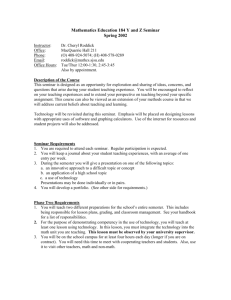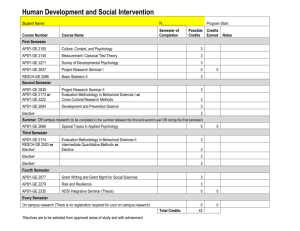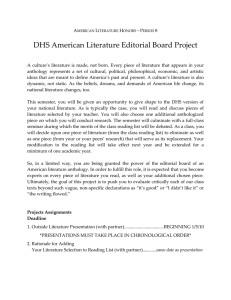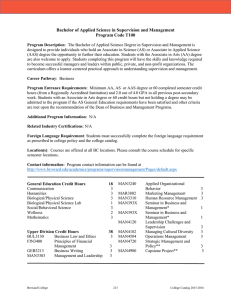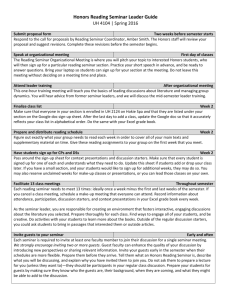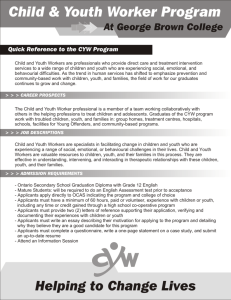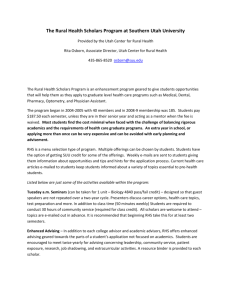UGS 4750: Leadership Capstone: Reflections on Leadership
advertisement
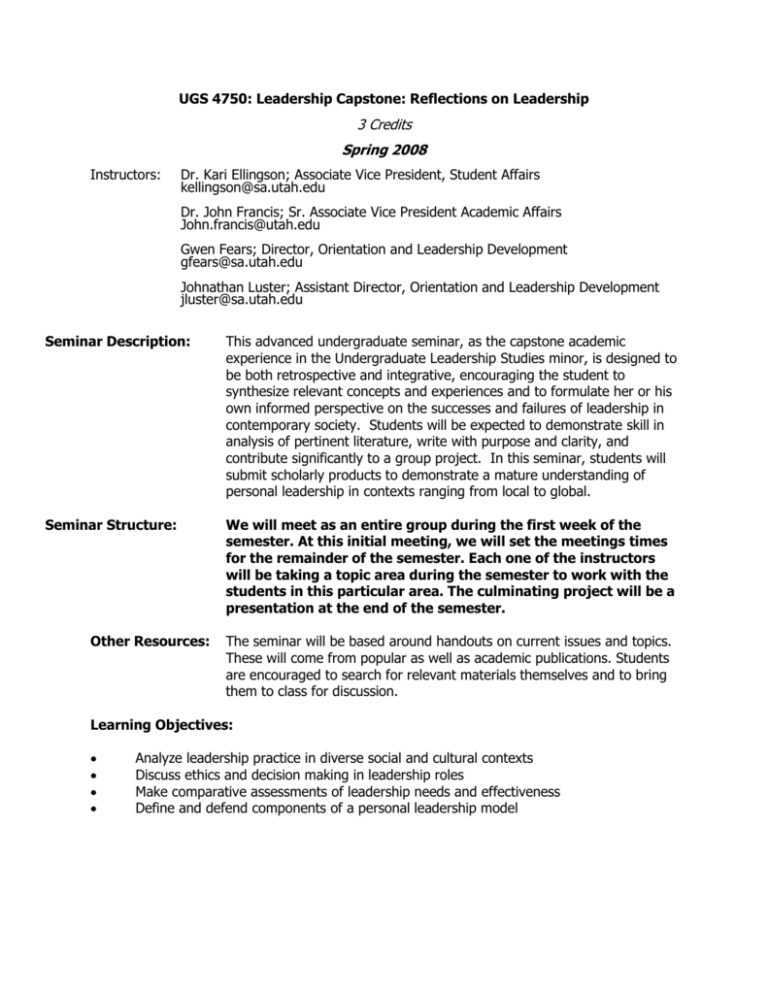
UGS 4750: Leadership Capstone: Reflections on Leadership 3 Credits Spring 2008 Instructors: Dr. Kari Ellingson; Associate Vice President, Student Affairs kellingson@sa.utah.edu Dr. John Francis; Sr. Associate Vice President Academic Affairs John.francis@utah.edu Gwen Fears; Director, Orientation and Leadership Development gfears@sa.utah.edu Johnathan Luster; Assistant Director, Orientation and Leadership Development jluster@sa.utah.edu Seminar Description: This advanced undergraduate seminar, as the capstone academic experience in the Undergraduate Leadership Studies minor, is designed to be both retrospective and integrative, encouraging the student to synthesize relevant concepts and experiences and to formulate her or his own informed perspective on the successes and failures of leadership in contemporary society. Students will be expected to demonstrate skill in analysis of pertinent literature, write with purpose and clarity, and contribute significantly to a group project. In this seminar, students will submit scholarly products to demonstrate a mature understanding of personal leadership in contexts ranging from local to global. Seminar Structure: We will meet as an entire group during the first week of the semester. At this initial meeting, we will set the meetings times for the remainder of the semester. Each one of the instructors will be taking a topic area during the semester to work with the students in this particular area. The culminating project will be a presentation at the end of the semester. Other Resources: The seminar will be based around handouts on current issues and topics. These will come from popular as well as academic publications. Students are encouraged to search for relevant materials themselves and to bring them to class for discussion. Learning Objectives: Analyze leadership practice in diverse social and cultural contexts Discuss ethics and decision making in leadership roles Make comparative assessments of leadership needs and effectiveness Define and defend components of a personal leadership model Assignments and Grading: 1) Ethics in Leadership: TBD (20%)- DUE: Week of February 4 1) Comparative analysis of leadership (20%). This assignment asks students to compare the written speeches of three leaders on the same topic using a conceptualization of leadership. For 2008 year, students will compare speeches on security issues by Barak Obama, John McCain and Hillary Clinton using 1) a theory of leadership or 2) Kouzes and Posner’s model of leadership. The paper will be between 5-7 pages in length. DUE: Week of March 3 2) Personal leadership model: (20%) This paper should demonstrate an integration of concepts learned, within a context chosen by the student. For example, students majoring in education may write a paper on how their personal leadership model will be implemented with regard to issues such as curricular reform at the state or national level. Students majoring in marketing may choose to write about consumerism and how to manage a career that acknowledges the importance of thoughtful citizenship while promoting consumption. A student interested in arts administration may write about how she or he would help to promote the arts by communicating their central importance at a time of diminished public funding. A student pursuing science administration might write about how he or she would hope to engage and perhaps shape public debates over the use of scientific evidence in public policy arenas. The paper will be approximately10 double-spaced pages in length. DUE: Week of April 7 3) Group discussion/presentation/project on leadership needs in a particular context. (40%) In this assignment, students are asked to reflect on the leadership needs in the 21st century for a particular international, national, regional or community context. In particular, the assignment requires that students apply at least three theories or perspectives to their chosen context. Thus, students may explore how well equipped realist, transformation, and participatory models of leadership are for achieving reconciliation in post-war Rwanda. Or, students may apply three models of leadership to coalition-building within the environmental movement in the U.S. The presentation will be for 45-60 minutes. The group project will be accompanied by a group paper of 20-25 pages. Group members will receive one grade. A personal reflection and reflection on the group process will be included as a piece of this assignment. DUE: Week of April 21




